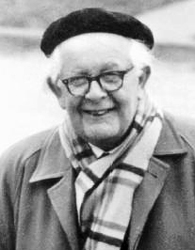Swiss psychologist Jean Piaget was the first to realize that the cognitive processes of children differ from those of adults. Over his 75-year career he contributed findings to developmental psychology, cognitive psychology and genetic epistemology. Reports Time magazine: “One might say that Piaget was the first to take children’s thinking seriously.”
Jean Piaget’s Early Days
Jean Piaget was born in Neuchâtel, a French-speaking region of Switzerland, on August 9, 1896. Although renowned for his research on the cognitive development of children, Piaget actually started out as an expert on mollusks.
Interested in biology from a young age, he eventually took a part-time job at Neuchâtel’s Museum of Natural History. By his early teens was a distinguished malacologist, or mollusk expert.
Piaget received his doctorate in zoology from the University of Neuchâtel and, intrigued by Freud’s theories, moved to Zurich to study psychology. There he attended lectures by one of Freud’s colleagues, Carl Jung, who is credited as the founder of psychoanalysis.
Sources in this Story
- The New York Times: Jean Piaget Dies in Geneva at 84
- Encyclopedia Britannica: Jean Piaget Biography
- PBS: Piaget describes stages of cognitive development
- Time: Child Psychologist Jean Piaget
- Child Development Institute: Stages of Intellectual Development in Children and Teenagers
Piaget’s Psychology Studies
It was not until Piaget began conducting research at the Sorbonne in Paris that he focused on cognitive psychology. The discipline, as Encyclopedia Britannica points out, allowed him to combine “his biological training with his interest in epistemology.”
In France, Piaget taught at a school run by Alfred Binet, creator of the Binet intelligence test (the forerunner of today’s IQ test). He noticed that his young students consistently answered certain questions incorrectly.
“He was fascinated with finding that at a certain age, children could solve a particular reasoning problem, but, more than that, at an earlier age, they nearly always gave the same wrong answer,” explains PBS.
He concluded that the cognitive processes of children must differ from those of adults. After returning to Switzerland in 1921, he was appointed director of the Rousseau Institute in Geneva and married one of his students, Valentine Châtenay. Piaget studied their three children to understand the development of thinking.
Piaget conducted most of his research in question-and-answer conversations. This allowed him to observe how his subjects’ thinking changed over time. He believed “the way to understand anything is to understand how it evolves,” says Time magazine.
He divided cognitive development into four stages: Sensorimotor, Preoperational, Concrete Operational and Formal Operational. Through careful observation of his own children and of research subjects, he outlined the trajectory of intellectual growth and was able to specify the exact ages and common behaviors that accompany each period.
The Child Development Institute claims that an understanding of his model may help society realize that children are “not little adults” and can teach parents how to better interact with their little ones.
Piaget considered himself to be primarily an epistemologist—one who studies the development of knowledge. In 1955, he founded the International Center for Genetic Epistemology in Geneva.
Over the course of his research career, Piaget published over 50 books and 500 papers, almost all of which can be found in the Jean Piaget Archives. He served as professor and director of several institutes at the University of Geneva, the University of Lausanne, and the Sorbonne.
The Jean Piaget Society, dedicated to the study of the developmental construction of human knowledge, has lists of resources for students and teachers wishing to learn about Piaget and his concepts.
The Rest of the Story
Piaget earned a number of honors in his career, including honorary degrees from Harvard and Oxford, among other top universities, and the Erasmus Award in 1972 for his theory of cognitive development. Despite his success, Piaget remained “a remote public figure,” writes The New York Times.
He spent summers at an Alpine retreat where he could meditate and work on such writings as “The Construction of Reality in the Child.”
He quietly passed away in Geneva on September 17, 1980, at the age of 84. His work went on to influence great psychologists like Erik Erickson and Lawrence Kohlberg.











